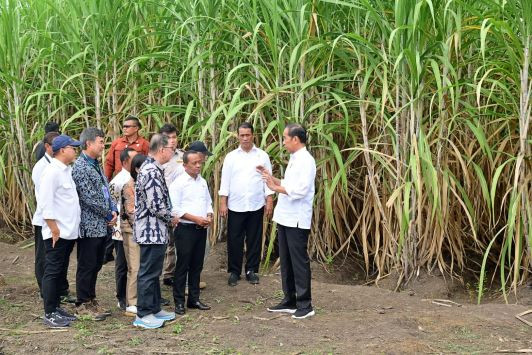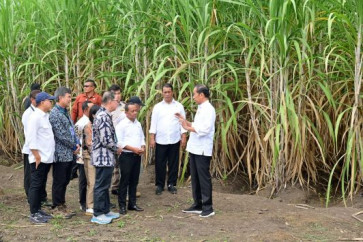Popular Reads
Top Results
Can't find what you're looking for?
View all search resultsPopular Reads
Top Results
Can't find what you're looking for?
View all search resultsThe environmental and social risks of the Papua sugarcane megaproject
The government's massive, 2 million-hectare sugarcane plantation must adopt and implement an integrated approach to sustainability that considers environmental and indigenous rights as well as adheres to international standards while involving the Papuan people, both from the get-go and at each stage of the project.
Change text size
Gift Premium Articles
to Anyone
P
resident Joko “Jokowi” Widodo inaugurated on July 23 a seedling planting project at a 2 million-hectare sugarcane development project in Merauke, Papua, against the risks of massive environmental damage and potential violation of the land rights and customary laws of of indigenous communities.
However, the multibillion-dollar project, which will be integrated with five bioethanol plants, a breeding research center, a major seaport and a 120-megawatt hydropower plant, will most likely breeze its way through all protests from human rights and environmental NGOs.
As the venture is classified as a national strategic project (PSN) for food security and energy transition, all licensing and other requirements will be expedited for the project’s necessary infrastructure, such as roads, a seaport and an irrigation dam.
Jokowi has appointed Investment Minister Bahlil Lahadalia to chair the special task force for realizing the megaproject that will involve public, private and foreign companies. According to Bahlil, five consortiums of public and private companies will develop the giant project.
The project’s objective makes complete sense, because sugar is a basic need. Even though Java was developed in the 19th century as a major sugarcane production center under Dutch colonial rule, Indonesia has become one of the world’s largest sugar importers due to a steady decrease in plantation areas.
According to the National Food Agency, Indonesia imports more than 50 percent of its annual sugar demand of 8 million tonnes for both household and industrial consumption as a result of steady increase in consumption compared to constant decrease in production.
Since Java, which now accounts for nearly 90 percent of domestic sugar production totaling 2.5 million tonnes, can no longer accommodate sugarcane plantations while other major island territories such as Sumatra, Kalimantan and Sulawesi have been preoccupied with rubber and oil palm, coffee and cacao estates, Papua, the country’s least developed region, seems to be the most suitable location for such a massive project that requires million hectares on a vast stretch of contiguous land.



















